'Yes Means Yes' Sets Affirmative Consent Standard for California
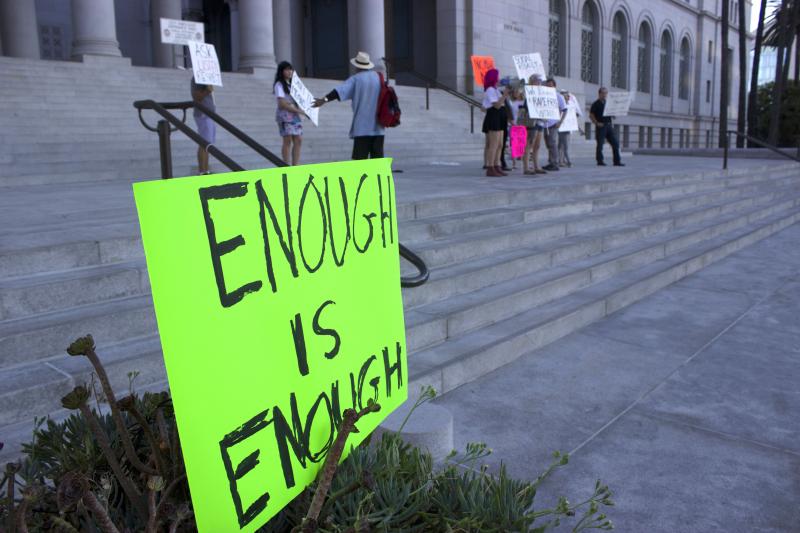
One in every five college or university women will be sexually assaulted before graduation, according to a study by Investigative West.
However, according to the National Institute of Justice, many of those rapes and sexual assaults, on both women and men, go unreported because the survivor is unsure about the meaning of consent, is worried no one will believe them or they have heard about their school mishandling other cases. Maybe they are just scared.
All these reasons and more contribute to why Senate Bill 967, commonly known as “Yes Means Yes,” was crafted. Gov. Jerry Brown signed the bill into law on Sept. 28, making California the first state to adopt affirmative consent policies for colleges and universities who receive government funding.
“We are all really, really happy the legislation passed and was signed into law by Governor Brown on Sunday,” said Sofie Karasek, a student at the University of California at Berkeley and a co-founder of End Rape On Campus (EROC), a group that helps students file federal complaints in terms of mishandling sexual assault against universities across the country. “We think that it's a really important step forward for the state of California and we hope that the rest of the country will follow suite.”
About the Bill
Senate Bill 967 is the first of its kind. The bill forces colleges who receive government funding to adopt stricter laws on affirmative consent, sexual assault training, orientation practices and victim/survivor-centered protocol.
Senator Kevin de León wrote the bill because campus sexual assault was too prevalent in California. The state needed to “fundamentally change the rape culture that is so pervasive in our media and on our campuses,” de León said in a press release after the bill was announced.
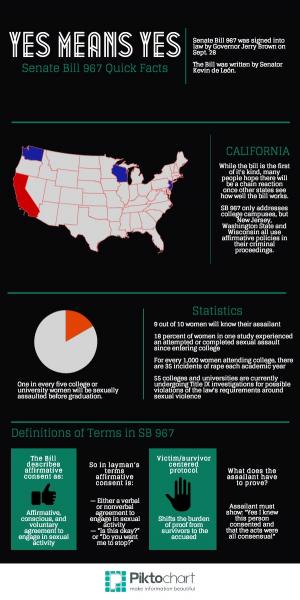
“Affirmative consent shifts the dynamics of what we look for in sexual activity,” said Ruth Jones, the Title IX Coordinator at Occidental College. “Instead of a no, you look for affirmative consent: You look for a yes in words or actions, prior to engaging in sexual activity.”
However, affirmative consent is not defined as verbal consent. A lot of communication is done through body language, and the bill acknowledges that. Plus, explained Karasek, consent is supposed to be unambiguous, affirmative and it can be revoked at any time.
SEE ALSO: 'Yes Means Yes' Isn't The End of Sex
“If someone is okay with (one sexual activity) that doesn't necessarily mean they're okay with having intercourse and that also reflected in the standard,” said Karasek in a phone interview between classes at Berkeley. “And also it has to be voluntary. For example, if somebody asked (a partner), ‘Do you want to have sex with me?’ and the person responds no and then the other person keeps asking, that’s not consent. Because you’re coercing the other person to agree with you even when they don’t want to.”
SB 967 also prohibits the accused of using self-intoxication or recklessness as a valid excuse for the assault. Finally, the bill creates a “preponderance of the evidence standard in terms of disciplinary action,” hence the nickname “Yes Means Yes,” the accused has to prove that they had a verbal or nonverbal “yes” from the accuser.
“(The bill) is shifting the burden from being on survivors to prove that they said no and therefore it was unconsentual,” said Karasek. “So instead it shifts the conversation and it shifts the burden from being on survivors to being on the assailant to say “Yes, I knew that this person was consenting, yes this person consented.”
Karasek explained that this was a substantial shift because many times the survivor did not say no because they were under threat of force or coercion, they were in shock or they were intoxicated by drugs or alcohol. Therefore, it is “very important to hold the perpetrator accountable.”
Orientations and Trainings
“Yes Means Yes” goes beyond affirmative consent. It also requires colleges and universities to adopt “victim (or survivor) centered sexual assault response policies and protocol that protect the confidentiality of students.” In doing this, schools must work with existing organizations on and of campus to offer mental health, victim advocacy, legal support, counseling and health services.
Students, faculty and staff must all undergo comprehensive prevention and orientation programs addressing “sexual assault, dating violence, domestic violence, and stalking.” The bill also mandates programs that will help raise awareness, focus on women’s empowerment and teach students about bystander intervention.
The University of Southern California, as well as other schools in California, have already adopted an affirmative consent policy on campus.
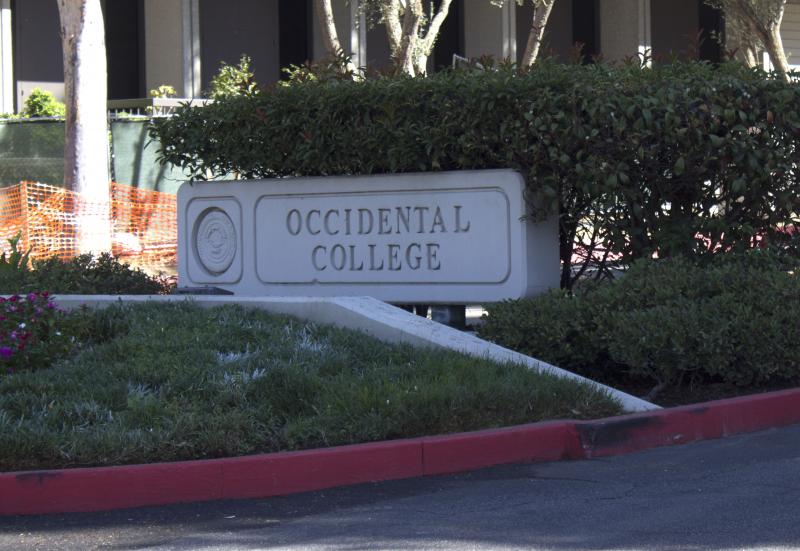
“The USC Student Code of Conduct already includes an affirmative consent standard,” said Jody Shipper, executive director, USC Office of Equity and Diversity and Title IX Coordinator in a statement sent by her office. “Multiple units and departments at USC have been involved in educating students on consent, available resources and bystander response training."
SEE ALSO: 'Yes Means Yes' Assault Bill Introduced
Jones has also started training programs at Occidental College for students, faculty and staff.
“Traditionally people think of prevention as, what do the students do?” Jones said in her office, one humid morning a week before the bill was signed into law. “But in the training programs I have put together for staff, faculty and administrators, I focus on the fact that we can all contribute to creating the type of campus climate where sexual assault is unacceptable. I want whoever someone turns to for support to know the resources available and they will know the right things to say.”
The people who sit on hearing panels will also go through strict training.
“If schools will abide by this law that means hearing panels will be of a much higher caliber, or they’ll be less skewed in the favor of the assailant, which is what usually happens,” said Karasek. “Usually you have survivors who are questioned for personal decisions that they may have made. So, typical questions [include], ‘Were you drinking that night?’ ‘What were you wearing?’ ‘Did you have a prior sexual relationship with this person?’ So by having training we hope that this law will be able to avert some of those problems.”
A Step in the Right Direction
Sexual assault became a hot topic in the United States, starting back in May with the U.S. Department of Education release of 55 colleges and universities undergoing Title IX investigations and continuing with the White House’s new campaign: It’s On Us.
“Our sisters, our daughters, our nieces — every woman deserves the right to pursue the dream of higher education without being threatened by the nightmare of violence and sexual abuse,” said de León in a press release Governor Brown signed SB 967. “The Governor’s signature on this legislation is an important step to prevent that kind of nightmare on our college campuses.”
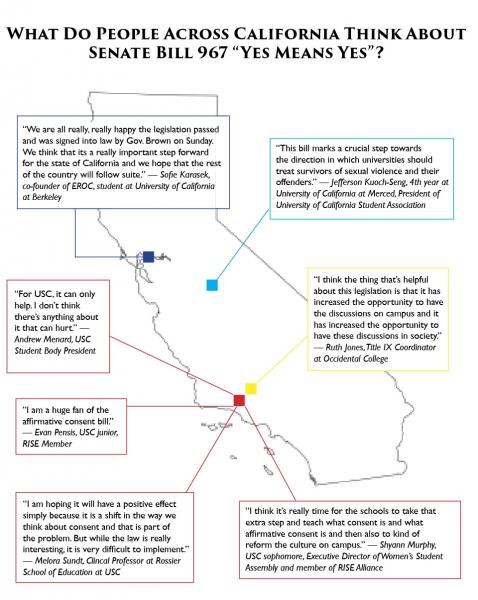
“I think that the ‘Yes Means Yes’ bill is excellent progress but I don’t think it is by any means a last step in order to solve the issue of sexual assault especially on college campuses,” said Shyann Murphy, a USC sophomore, the executive director of the Women’s Student Assembly and a member of RISE Alliance. “I think it’s really time for the schools to take that extra step and teach what consent is and what affirmative consent is and then also to kind of reform the culture on campus.”
RISE, a new organization implemented this semester, is a coalition of groups who are working on the problem of sexual assault on campus. The organization hopes to coordinate the effort and work with student groups across campus to change the social structure surrounding sexual assault.
“A lot of people feel that, especially at parties and party culture, that there’s an entitlement to someone else’s body and we want to make sure that people can respect other people’s bodily autonomy and their right to say no and we can also foster an environment where saying no isn’t something that makes you feel like a fun-killer or anything like that,” Murphy said in a phone interview.
SEE ALSO: Dear Freshmen Women, Be Wary
One concern is that perpetrators are not being punished. Murphy hopes the bill will address this concern.
“It is extremely rare for people who have raped someone to actually get expelled or have really any type of consequences,” she said. “Which says a few things. One it sends the message that ‘It’s not like anyone is going to care, do what you want.’ Then it also sends the message to survivors of ‘Why should I report when nothing’s going to happen?’”
Another member of RISE, Evan Pensis, is a “huge fan” of the affirmative consent bill.
“I, studying rape law historically, think it’s a huge step in the right direction because hopefully no longer will juries be asking how the assailant said yes versus how the person who was assaulted said no,” said Pensis, a junior, while sitting in the Nazarian Pavilion outside of USC’s Doheny Library. He believes that the law is good because it challenges the heteronormative ideas of romance that people often learn from Disney movies.
However, Pensis does not think the bill itself will have an influence on USC or other Californian students. Instead he believes that the groups, such as RISE and the Center for Women and Men, will be the ones to disseminate information and break it down for students.
SEE ALSO: The War At Home: Untested Rape Kits A National Disgrace
Melora Sundt agrees with the idea that the bill challenges old romantic ideals. She has been called a “wet blanket” for suggesting that students ask for consent during sexual activities by people who believe stopping to ask will interrupt a romantic moment.
“But we’re not talking about a romantic moment here,” said Sundt, who has a four-part blog series on sexual assault. “We’re talking about a prelude to violent moment. And if it were really a romantic moment, what’s wrong with asking and securing consent?”
Sundt hopes the bill will have a positive effect simply because it shifts the way people think about and talk about consent.
“I like the idea that it’s metaphorically forcing us to think a little differently about the dynamics (of sexual activity and sexual assault), but I don’t know if it’s going help a whole heck of a lot because it’s still hinging so much on the issue of consent,” she said. “We still have so many issues around that.”
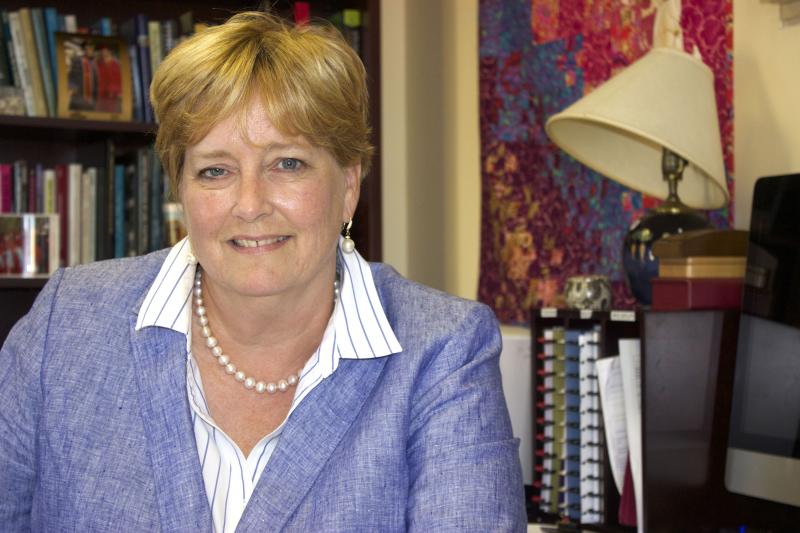
“This bill marks a crucial step towards the direction in which universities should treat survivors of sexual violence and their offenders,” said Kuoch-Seng during a phone interview. “UCSA has a few consent campaigns … and we’re also trying to figure out how to work with the White House on their campaign “It’s on Us.” So it’s really interesting that this isn’t a state-wide movement, this is a nation-wide movement.”
Problems with the Bill and Negative Reactions
No bill is perfect and SB 967 is no exception.
Sundt believes the bill will be difficult to implement. Each school defines affirmative consent differently: some get very specific about non-verbal behavior while others stay vague.
“Consent happens in a context and until we get more savvy about understanding the context too, I think we’re going to have some difficulty,” she said.
Though supportive of the bill, Pensis struggles with the dichotomy of liking the vagueness of the bill and seeing the problem with it.
“I think that it’s a little tricky because it doesn’t outright define consent necessarily,” he said. “I think that’s the brilliance of it though. It sets a precedent where people are not trying to get the conversation out of the way early on in the socio-sexual interaction, they have to maintain that conversation for the entire process. Which is much more what actual consent looks like.”
While many students and administrators agree with the bill, there were people who urged Governor Brown not to sign.
SEE ALSO: Rush Limbaugh Spawns Outrage Over 'No Means Yes' Comment
The National Coalition of Men (NCFM) strongly disagrees with the bill. In a letter to California State Senators, they claimed “the adoption of SB 967 will deny people at California colleges and universities fundamental rights of equal protection and due process when accused of sexual violence, domestic violence, dating violence and stalking.”
In the letter, the NCFM also claimed that the language was vague and the bill was filled with constitutional violations. The group said that the accusers were able to hide behind the idea of “victim-blaming” and “fosters victimization of the innocent.”
Meanwhile, Stop Abusive and Violent Environments (SAVE), a group based in Rockville, MD, does not hate the whole bill, but disagrees with certain aspects.
“The reason why we oppose it is really just because we don’t think it really helps the victims or the accused and it removes some Constitutional protections that both have in place,” said Gina Lauterio, the program director of SAVE, two weeks before the bill was signed. “Rape is a criminal activity. And with any criminal activity the problem isn’t that they don’t know what right and wrong is, but they don’t care what right and wrong is. And I don’t think that bill is going to help clarify that.”
One issue they see, explained Lauterio, is in the definitions. SAVE fears that since legislatures did not define consent well, students and administrators who are untrained will also have trouble.
SAVE is also worried about the shift of burden of proof.
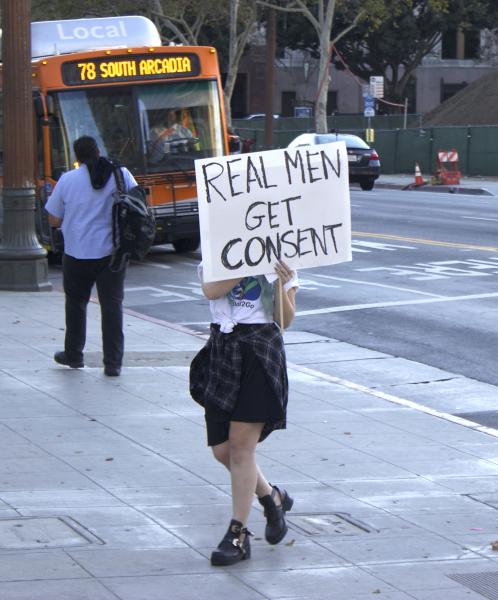
Next Steps
Those supportive of the bill do not see this is as the end-all-be-all to campus sexual assault. Instead, supporters hope the bill will start conversations and discussions on campus about how to further prevent sexual assault and educate the study body, administration and faculty.
The Student Body President at USC, Andrew Menard, hopes to use this bill to set up goals of where USC can improve and how.
“I think the next step is making sure that we are not only executing but holding ourselves accountable for the progress that we’re making,” said Mernard, a senior business major. “So every few weeks taking a moment to think, ‘Okay, what have we accomplished over these past few weeks? Where are we trying to go?’ And I think if you have an organized plan of attack or strategy, I think that’s ultimately going to dictate how successful we are in terms of this mission and this goal.”
SEE ALSO: Special Report: Investigation Into Sexual Assault At USC
Alexa Schwartz is a USC graduate who majored in theater. Skyping from her apartment in West Hollywood, Schwartz, who helped file the Title IX case against USC last year, said several abuses outlined in the complaint were being addressed by the new bill. One of them was denying survivors the right to an advocate while in the student judicial affairs room and showing insensitivity during the meetings.
“That’s a huge thing for a survivor because everything that is happening to you is so intensified by the fact that you are going through possibly PTSD and so to have an advocate come in with you and to be shown general sensitivity from the people talking to you makes a really big difference, helps you keep your cool while you’re trying to tell this horrible story,” said Schwartz. “And being insensitive, obviously, just really takes away from that.”
Schwartz said she is unsure if this bill will stop serial rapists—a concern Sundt shares—but does think the general student body is uneducated about what constitutes as consent. Schwartz believes the bill will help open doors for communication and help educate students.
“The main reason I support it is because it will help survivors who choose to come forward,” she said. “And it is my hope that it will be more possible for survivors to show what was committed against them because having an absence of a ‘no’ is not going to be taken as a ‘yes’ by the adjudicating panel.”
Reach Senior News Editor Rebecca Gibian here or follow her on Twitter here.



